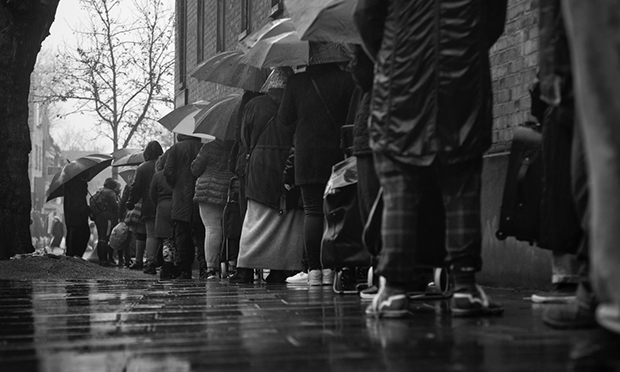Food poverty causing ‘growing divide between haves and have-nots’ in Hackney, warns charity boss

A long queue outside Hackney Foodbank. Photograph: Kristian Buus
The impact of food poverty is becoming “totally overwhelming” for community workers in Hackney – who say it is like “trying to plug a hole in the dyke”.
Nicolette Nixon, from H.O.P.E at Morningside, told Town Hall bosses “there is a growing divide between the haves and the have-nots, which is causing real problems”.
She was giving evidence at a scrutiny panel that is looking at ways to reduce poverty and inequality in the borough.
Councillors have also visited Woodberry Aid, Chicken Soup Shelter and Volunteer Centre Hackney to hear about their experiences.
H.O.P.E at Morningside’s food bank supports 700 people a week, and its food hub helps 1,500 more, as well as providing 30 to 40 meals a day for children.
Nixon told councillors that the cost-of-living crisis is biting hard: “We don’t have enough food to support people who come to us.”
The scheme relies on support from the Felix Project, which passes on surplus food to charities and community groups across London.
Nixon said the charity is forced to “make judgement calls on who is in crisis and who isn’t” because of the lack of resources.
She stressed that judgements cannot be based on people’s appearances, citing an example of a “very smartly dressed” visitor who was in a real crisis and in desperate need of help.
The organisation, which is based on the Morningside estate in south Hackney, also offers emotional support and advice on issues such as housing disrepair and domestic violence.
During the pandemic, the focus was about supporting people through that tough time, and it has now pivoted to dealing with the cost-of-living crisis.
The pandemic’s legacy is also seeing “behavioural changes”, said Nixon, with “aggression being played out in schools”.
The despair over food is also affecting adults, she added.
“During the pandemic, everyone was trying to help each other, and I think now everyone’s trying to get to that food, because everyone’s desperate for food and desperate for support.”
She warned: “It’s becoming really difficult to support people because the need is so overwhelming and so many people are coming in.
“On average, we’re getting 10 referrals a week for food and there’s a point where you have to have a cut-off – but who do you cut off, as an organisation?”
She said the dilemma facing charities is whether it is best to give less food to everyone, “which doesn’t really do anything”.
“Sometimes you feel like the boy in the dyke and you just have your thumb plugged in a hole that’s getting bigger and bigger all the time, and what can you do to stop that?
“It’s just totally overwhelming.”
She also feels that food banks are not sustainable, and the long-term plan is for people to use a community pantry where people pay for a bag of food.
This could use its purchasing power to offer food at cheaper prices, if funding is available.
Jabez Lam, manager of Hackney’s Chinese Community Centre, said he is looking at creating a community kitchen when the organisation moves to its new council-funded home in De Beauvoir. The centre also grows food for its lunch club and plans to continue this.
It provides a range of support for the Chinese, Vietnamese and Malaysian community in Hackney and has government funding to help people who have come to the UK from Hong Kong.
Council staff said that while the government’s household support fund is welcome, it works out at a few hundred pounds per household and is ” not going to go far enough”.
The Town Hall has launched a Money Hub to help people get their fuel vouchers and investigate if they are entitled to benefits they may not be claiming. It is estimated that £13m of benefits go unclaimed in Hackney each year.
